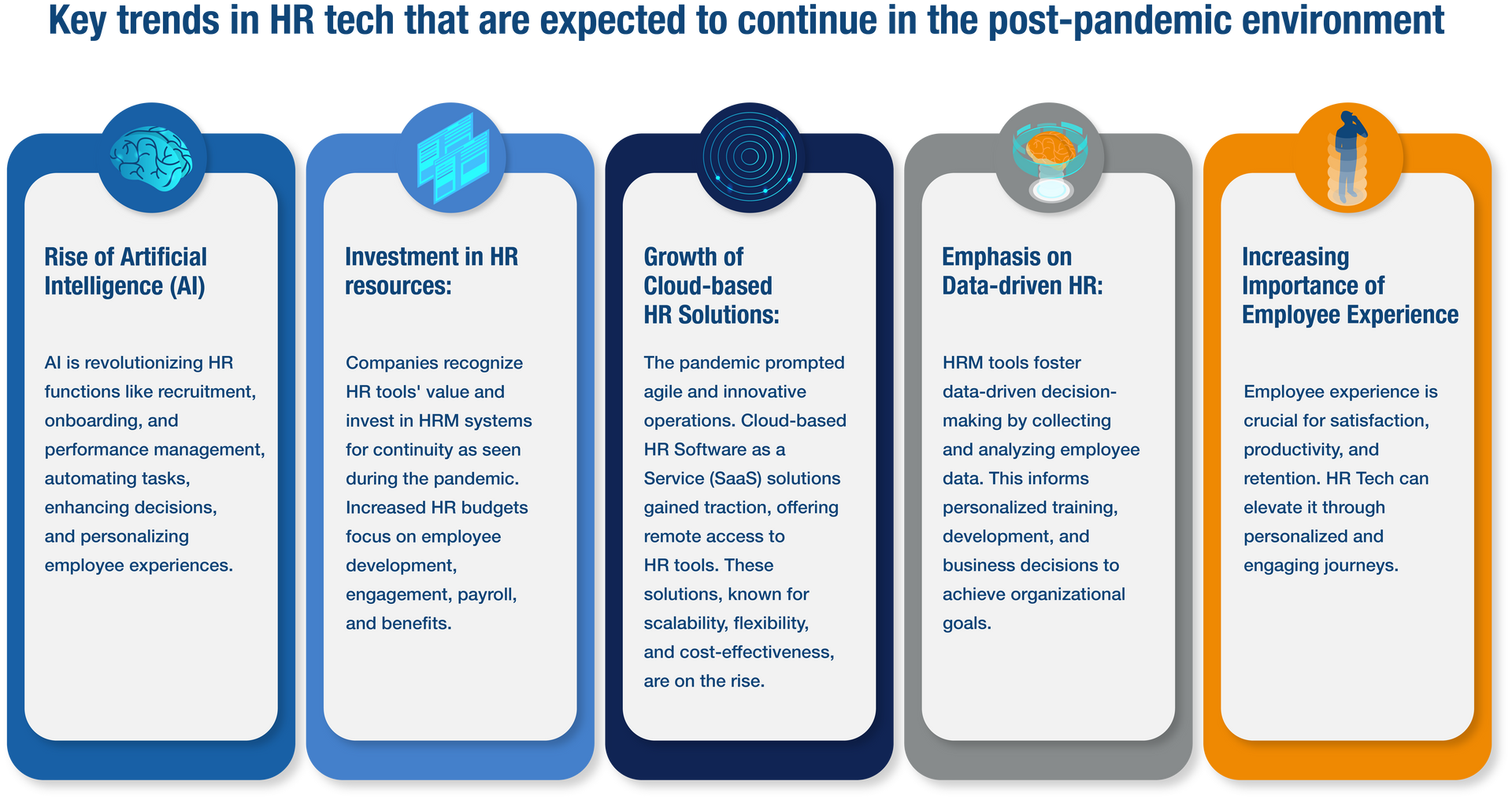Share
The global pandemic forced businesses to embrace virtual work and became a catalyst for digital transformation of Human Resources (HR) management. While HR technology has been around for some time, the pandemic accelerated its adoption and elevated its significance in the post-Covid era.
HR Tech refers to the deployment of digital tools and software to streamline HR processes and optimize workforce management. In the post-Covid context, the role of HR Tech has expanded from aiding HR managers in day-to-day administrative tasks, to playing a crucial role in navigating strategic HR functions and driving business sustainability. HR Tech can help businesses manage the challenges of remote work, such as employee engagement, compliance, and security. It can also help businesses attract and retain top talent, improve employee satisfaction, and productivity.
How is HR Tech Being Utilized in a Post-Pandemic Environment?
- Managing the challenges of remote work, such as employee engagement, compliance, and security. For example, HR Tech can be used to provide employees with access to training and development resources, to track employee hours and productivity−ensuring that employees follow company policies despite working remotely.
- Attracting and retaining top talent by automating the recruiting process, screening candidates, and assessing employee skills and potential. Data-driven HR Tech tools like predictive analytics, optimization algorithms, and machine learning can assist HR managers to identify talent gaps, reskill their workforce, match skills to tasks, and cultivate diverse talent pipelines. Additionally, talent management platforms like Workday, Cornerstone, and SAP SuccessFactors have streamlined workforce collaboration by creating virtual spaces for communication and collaboration.
- Improving employee engagement by providing access to learning and development resources, tracking employee satisfaction, and creating a more personalized employee experience. Moreover, with the disruption of traditional organizational structures and the rise of the gig economy, HR Tech has a critical role to play in unlocking the value of human capital and managing diverse workforce demographics.
- Enhancing employee productivity via tools and resources that help them work more efficiently, track time and productivity, and provide feedback and support. Moreover, HR Tech can also aid in developing an agile workforce, promoting employee wellness, and enhancing organizational resilience. HR Tech can enable organizations to create personalized employee experiences, including digital wellness applications, mental health support systems, and flexible working arrangements. By empowering employees to take control of their physical and mental well-being, HR Tech can unlock profound productivity gains and contribute towards a healthy and vibrant workplace culture.
The rise of adaptation to HR Tech post pandemic was a turning point in many organizations globally. It can help businesses adapt to the new challenges of remote work, attract and retain top talent, and improve employee satisfaction and productivity.

While the post-pandemic workplace continues to evolve, it’s clear that HR Tech will play an increasingly important role in the future of work. HR Tech has been a major revolution in a post-pandemic environment, where its increased adoption has led to a surge in investment in the sector, with private equity firms playing a leading role.
There are several reasons why private equity firms are investing in HR tech. In 2022, global HR Tech deal transactions valued at nearly $11B, an increase of 282% since 2020’s pandemic. The trend is likely to continue in the years to come, as businesses continue to adopt HR Tech to improve their efficiency, productivity, and compliance.
Stax, with the help of our industry experts, stays informed on market advancements and trends to provide our clients with current, actionable insights to transform their portfolios for the better. To learn more about Stax and our services or contact us.
Sources
- “10 Tips for Successfully Managing Remote Workers,” SHRM, Apr. 2020.
- “23 Must-Have Tools for Remote Workers,” Vantage Circle, Mar. 2023.
- “A Guide to Managing Your (Newly) Remote Workers,” Harvard Business Review, Mar. 2020.
- “Remote workforce technology boosts employee productivity,” TechTarget, Oct. 2020.
- “Why HR Technology Can Save Your Business in the ‘Next Crisis,’” Links International, Apr. 2021.
- “COVID-19 oriented HRM strategies influence on job and organizational performance through job-related attitudes,” PLOS, Apr.
- “Challenges of HR And Its Shift Post COVID-19 Pandemic,” Vantage Circle, Apr. 2023.
- “6 Common Hr Technology Challenges And How To Overcome Them,” Merritt Business Solutions, retrieved Jun. 2023.
- “Top 15 HR Challenges in 2023 (+Solutions),” Whatfix, Oct. 2022.
- “How COVID-19 Is Changing HR Technology Investment,” SHRM, Nov. 2020.
- “How HR Tech is helping organizations embrace the post-COVID-19 world,” Unleash Group Ltd, Mar. 2021.
- “Top HR Tech Trends,” SHRM, February 2023.
- “The value of HR technology in a post-pandemic world,” KM Business Information Canada Ltd., Feb. 2023.
- “How to Evaluate HR Technology Post COVID-19,” Puja Lalwani, Dec. 2020.
- “HR tech: 5 PE-backed deals that bring innovation to workforce management,” PE Hub, Feb. 2023.
- “Global HR Tech Report Q1 2023," Drake Star, Feb. 2023.
- “What do investors look for in their next HR tech project?,” Dan Cave, Mar. 2023.
- “Gartner Identifies Top Four HR Investment Trends for 2023,” Gartner, Mar. 2023.
- “Top 10 Human Resource Technology Companies Around Globe,” Fortune Business Insights, Jan. 2023.
Read More






